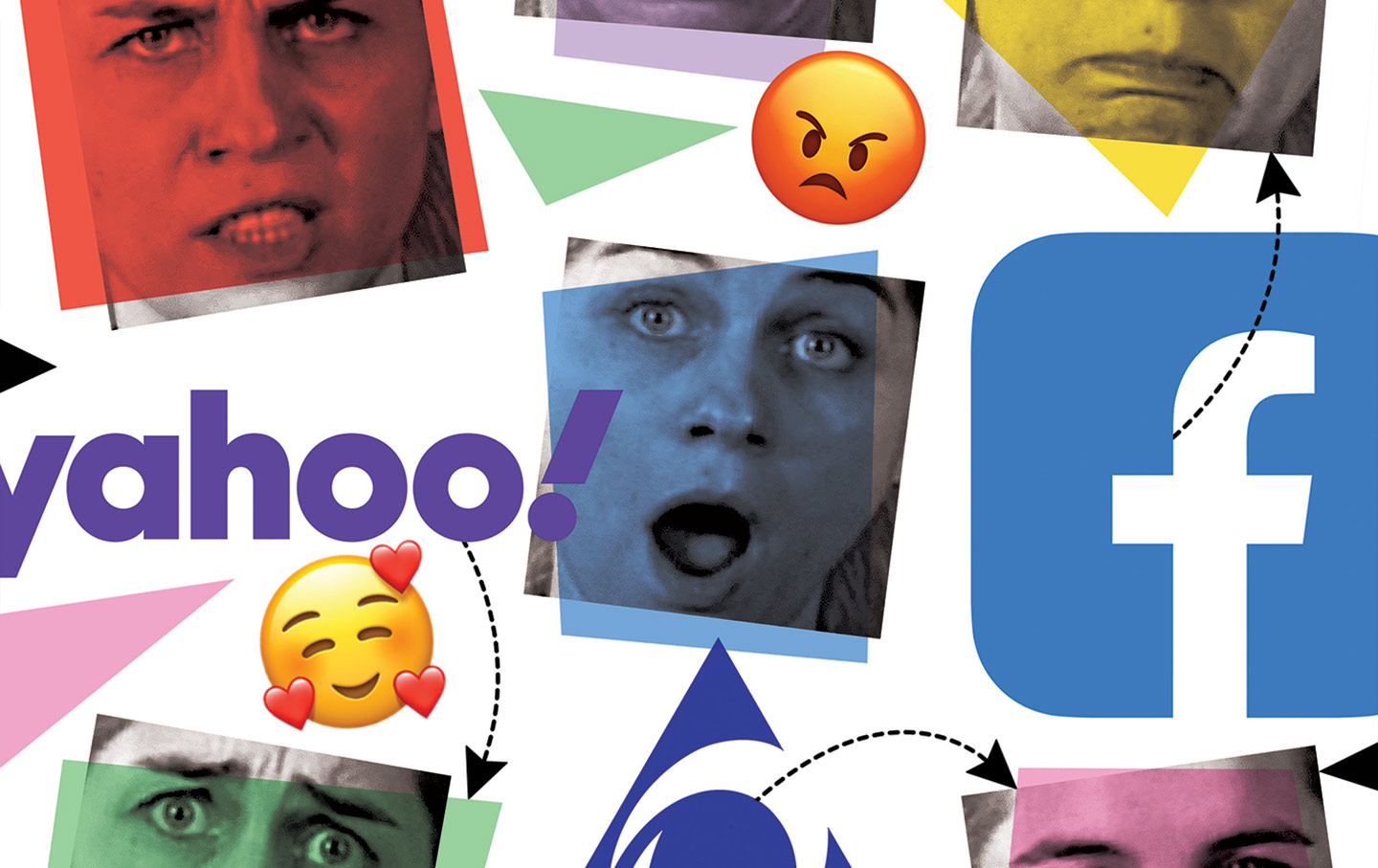Rebecca Solnit on Trump,
Books, and the Reincarnation of King George III
A conversation with the writer and activist about living in a nation where those who lead are often disinclined to read—let alone write—meaningful books.

Rebecca Solnit, the nimble and adventurous public intellectual who has written some of the most thought-provoking books of our times, has made no secret of her disdain for Donald Trump. And one of the things that really troubles her is that he has little inclination toward reading, let alone respect for the books that might provoke deeper thinking on the part of the most powerful man in the world. Solnit spoke with me in late August about Trump, books, and our disconcerting times. This portion of a longer conversation has been edited for length and clarity.
—John Nichols
John Nichols: You recently posted an image of Trump with Ukrainian President Volodymyr Zelensky and French President Emmanuel Macron at the White House in front of a display of hats with pro-Trump slogans such as “Four More Years.” They were displayed on what looked like a bookshelf. You wrote: “What to do with a bookshelf when you’re not up to books.” That’s a good place to start, because it does strike me that if we’ve ever had an administration that wasn’t about books—except, of course, when it’s banning them—Trump’s is the one.
Rebecca Solnit : He makes George W. Bush and Ronald Reagan look like, I don’t know, Plato and Aristotle. (Sorry, Plato and Aristotle—I don’t mean it!) But how many times can you say how profoundly stupid Trump is? So far as anyone can tell, he doesn’t read. He was once asked what his favorite verse from the Bible was—you know, the book that he held up in his anti–Black Lives Matter moment [in front of St. John’s Episcopal Church in Washington during the 2020 protests over the murder of George Floyd]—and he had to give one of those weird, evasive, jellified answers he gives, because he couldn’t [talk about] the Book of Job, or Matthew, or Leviticus, or anything fun like that, like normal people mostly can.
JN: “Weird, evasive, jellified answers” seem to be the norm.
RS: It feels like part of this horrible new culture where you can have any truth you want—as if history began and ended yesterday. Everything’s infinitely revisable, and there’s no accountability. [The Library of Congress website] even put up a version of the Constitution that was missing some crucial parts [which it blamed on a coding error].
JN: This spring, Trump was asked what the Declaration of Independence meant to him, and he said, “It’s a declaration of unity and love and respect,” when it’s actually an explanation of why the Continental Congress rejected British colonial rule.
RS: King George’s reincarnation reads the Declaration! That document has been used against Trump, including by me and a friend right after the 2016 election, because he fits the description of [the monarch] who is imposing all the insults and injuries—taxation without representation, all of it. And listening to you makes me think that, with Trump, it’s almost as though television became an Antichrist and appeared on the earth. Everything wrong with TV and social media, all the fluid, gelatinous, dumbed-down, pandering, unreliable stuff, just pours out of him incessantly. And the fact that TV made him what he is—because TV portrayed him as a very successful and decisive businessman when he was actually a daddy’s boy, a serial bankrupt—he is TV, in a way.
JN: When he was doing reality TV, at the peak of his pre-political celebrity, he put out books [cowritten by a speechwriter] about how to get rich. They were not robust outlines of his political philosophy. They were get-rich-quick manuals.
RS: From a guy whose get-rich-quick scheme was to be born to a very rich father who would bail him out repeatedly.
JN: They were also “how to be like me” manuals.
RS: It was just another snake-oil-salesman product from a guy who was selling steaks. Snakes, steaks—somewhat different, but still being sold by Trump, along with all kinds of other ridiculous things. He’s television incarnate. He’s a carnival huckster. He always seems like something semiliquid to me, some kind of vomitous slime mold lurching along in his inanity and repulsiveness.
JN: But it’s not impossible to be a leader and a great reader, even a great author. Michael Foot, the British parliamentarian, cabinet member, and Labour Party leader, thought a lot about this. He served in powerful positions, led his party in opposition to Margaret Thatcher. But he was also a respected biographer and essayist, an obsessive reader and book collector. He wrote well-regarded books on Byron and Swift and was one of the great commentators on the legacy of Tom Paine. Foot famously said, “Men of power have not time to read, yet men who do not read are not fit for power.” I am interested in your thinking on what it means to have a grounding in books, in literature.
RS: Most of us are so caught up in the moment, but I did spend the first 40 years of my life reading really intensely. And I think for people who get elected, who otherwise get really engaged in the moment, hopefully, the books are there as a foundation for some kind of breadth and depth in your understanding.
JN: For those in positions of power, elected leaders, even when they are caught up in the moment, I think there is a value in pausing to reflect. In the past, leaders recognized the need to read—and to write. And this was true across the ideological spectrum. We have had liberal and conservative leaders throughout history who have taken it on themselves to write books that matter. Churchill wrote constantly. Nixon wrote books that examined personal and political crises with insight and at least some self-awareness. Clearly, that’s not Trump. But I’m wondering if the speedup of society has taken too many of our most prominent political figures to a place where those who would lead are less inclined not merely to read books, but also to write them as vehicles for reflecting on and expressing their visions.
RS: It’s interesting because people like Elizabeth Warren [and] a lot of others have written good books. Alexandria Ocasio-Cortez hasn’t written a book yet, but I hope she does at some point, and I’m sure [New York City mayoral candidate] Zohran Mamdani will write a fabulous book when he slows down in about 30 years.
But, yes, we live in this accelerated world that often feels to me to be too fast for thoughtfulness, depth, full consideration, etc., and it produces a kind of shallowness and glibness. And I think a lot of that speedup came from Silicon Valley, and the triple crisis of this moment feels like it’s authoritarianism, climate, and Silicon Valley, and they’re not in any way separate. As you can see with someone like Elon Musk, who does things like build AI power stations that are polluting Black neighborhoods [as, for example,] in Memphis so that he can have Grok turn into Hitler for a week—that kind of gets all three at once.
These giant corporations have spent insane amounts of money getting experts to figure out how to make us spend all our time with the porn, the shopping, the social media, the infinite scroll, and we all know it’s damaged attention spans. This brings us back to reading and writing, which require the capacity to stick with something for extended periods, to have a kind of focus and ability to engage with relative complexity.
JN: Don’t you think Trump feeds on this chaos? He’s figured out that if you say the most extreme things, and keep pushing it out, that you can be heard above the rest of the discourse. I worry that that’s what our politics has become.
Popular
“swipe left below to view more authors”Swipe →RS: Trump essentially had a 10-year infomercial called The Apprentice, which made him a highly public figure, and he had white male privilege. I wrote a piece for The Nation just before the 2016 election that I’m still really proud of, pretending that the genders were reversed. There was a very distinguished diplomat named Hilaire Rodham, who everyone respected. And there was this crazy, obese, chaotic sex-maniac loon named Donaldina Trump, who everyone laughed out of town.
You know, Trump has had every possible advantage. He has [relied on] outrage and the ability to say anything he wants and say something completely contradictory 10 minutes later. But it’s also built on top of so many kinds of luck and privilege that most of us don’t have.
Trump’s so lacking in self-discipline. He’s so stupid. He’s so ridiculous. No person of color, no woman, no queer person, could conduct themself in some of the ways he has and not go to jail, become an outcast, be generally despised, or at the very least not have a significant following—even if it’s a minority of the public—who continues to hang on his every word and really treats him like, you know, their redeemer.
JN: So the trends are not necessarily good. But you still believe in the power of the book.
RS: I do, I do. At the turn of the century, people had this messianic faith in the Internet…. It is a lot more now than it was then…. But I just always say, if it’s going to be the Dark Ages, I’ll be an Irish monk. You know, reading was not a universal human activity not that long ago. Maybe it won’t always be. But, in fact, there’s a resurgence of independent bookstores and a lot of enthusiasm for books. Turnout at readings is often quite huge. The readers are not disappearing.
JN: The independent bookstores that you just mentioned have, in many cases, become islands of resistance.
RS: Yes, yes. And public libraries! They really understand their mission in a very deep way, as supporting both a local community and freedom of thought and expression, that they are kind of First Amendment outposts: refusing censorship, supporting divergent ideas, and encouraging the depth of thought that you need for a democracy.
JN: And they have displays of books, not hats.
RS: We just walked a full circle right back to that damn bookcase… with Trump, the guy who’s showing off a shitty bookcase, showing he’s illiterate to two completely brilliant world leaders. He has no introspection, just this hungry-ghost, gnawing narcissism, this demand for attention. And I wonder if that narcissism is a sense of the shallowness of constantly needing other people to validate you and tell you you’re real, because you don’t have the inner life that, you know, luckier people do.
Sustain independent journalism that will not back down!
Donald Trump wants us to accept the current state of affairs without making a scene. He wants us to believe that if we resist, he will harass us, sue us, and cut funding for those we care about; he may sic ICE, the FBI, or the National Guard on us.
We’re sorry to disappoint, but the fact is this: The Nation won’t back down to an authoritarian regime. Not now, not ever.
Day after day, week after week, we will continue to publish truly independent journalism that exposes the Trump administration for what it is and develops ways to gum up its machinery of repression.
We do this through exceptional coverage of war and peace, the labor movement, the climate emergency, reproductive justice, AI, corruption, crypto, and much more.
Our award-winning writers, including Elie Mystal, Mohammed Mhawish, Chris Lehmann, Joan Walsh, John Nichols, Jeet Heer, Kate Wagner, Kaveh Akbar, John Ganz, Zephyr Teachout, Viet Thanh Nguyen, Kali Holloway, Gregg Gonsalves, Amy Littlefield, Michael T. Klare, and Dave Zirin, instigate ideas and fuel progressive movements across the country.
With no corporate interests or billionaire owners behind us, we need your help to fund this journalism. The most powerful way you can contribute is with a recurring donation that lets us know you’re behind us for the long fight ahead.
We need to add 100 new sustaining donors to The Nation this September. If you step up with a monthly contribution of $10 or more, you’ll receive a one-of-a-kind Nation pin to recognize your invaluable support for the free press.
Onward,
Katrina vanden Heuvel
Editor and Publisher, The Nation
More from The Nation

Let’s Not Forget Who Charlie Kirk Really Was Let’s Not Forget Who Charlie Kirk Really Was
The right-wing influencer did not deserve to die, and we shouldn’t forget the many despicable things he said and did.

In Arkansas, a Small Community Fights the Nation’s Next Mega Prison In Arkansas, a Small Community Fights the Nation’s Next Mega Prison
A secretive plan for a new state lockup angered people in a deep-red corner of rural America—and changed how some see incarceration.

What Are Drugs For? What Are Drugs For?
A conversation with P.E. Moskowitz about the chemical imbalance theory of depression, the false schism between prescription and recreational drugs, and collective psychic pain.

The Killing of Charlie Kirk Is Part of a Terrible New Era of Political Violence The Killing of Charlie Kirk Is Part of a Terrible New Era of Political Violence
Wide-open gun culture and hyper-polarization are bringing the "years of lead" to the USA.

How Did Republican Fashion Go From Blazers to Belligerence? How Did Republican Fashion Go From Blazers to Belligerence?
Trump and his cronies’ style reflects a platform where grievance is currency and performance is power.

The Lost Souls of the Internet The Lost Souls of the Internet
In "Searches", Vauhini Vara probes the ways that we rely on the Internet and how we periodically attempt to free ourselves from its grip.